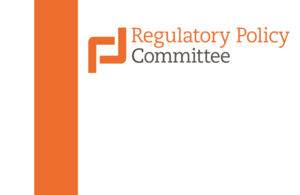Business groups respond to RPC's Regulatory Overview
Major business groups have responded positively to the RPC's Regulatory Overview

Terry Scuoler, CEO of the manufacturers’ association, the EEF said;
“The work of the RPC remains central to government’s commitment to reduce the cost and burden of regulation to business by £10 billion – and our expectation is that this will be achieved over the course of this Parliament. The RPC’s objective scrutiny of the government’s sums is essential in measuring its impact and success in cutting red tape. But, as an independent body with statutory status, the RPC’s role must be much wider than this. “This annual report rightly highlights a number of systemic shortcomings in government’s better regulation accounting, with some large costs to business excluded and a number of low-impact measures included. Now, more than ever, is the time for this government to show its better regulation credentials, and for the RPC to boldly hold it to account.”
Frances O’Grady, TUC General Secretary said;
“I welcome many of the recommendations in the report, but in particular the need to quantify the wider effects on society of proposals on regulation or deregulation. It is clearly wrong to look at issues such as the national living wage simply from viewpoint of the impact on business without looking at the wider benefit to the low paid and their families.”
Simon Walker, Director General at the Institute of Directors said;
“The Regulatory Policy Committee serves a valuable purpose in scrutinising the cost of government regulation on businesses. Whitehall departments continue to generate significant burdens for firms, so it is very important the RPC is there holding ministers’ feet to the fire. With the UK’s pending departure from the EU, there may well be a shake-up in business regulation over the coming years, making the RPC’s role even more important.”
FSB National Policy Director Martin McTague said;
“FSB members tell us that regulation is the number one issue they want this Government to focus on. This makes the role and work of the Regulatory Policy Committee vital to the future of our economy. The RPC has identified crucial gaps in the way the Government measures the cost of regulation on small business, and we agree that more now needs to be done to get the full picture of the burden of regulation on the UK’s small business community. Ministers and industry need that full picture before defining the approach to regulation in the new world after the decision to leave the EU.”
Adam Marshall, Acting Director General of the British Chambers of Commerce said;
“We welcome the release of this report and support the work the RPC is undertaking to help reduce the burden of regulation.
However, the findings in this report are a cause for concern for business, particularly the figures which show the material impact the National Living Wage is having on businesses, at a time of slowing economic growth and heightened uncertainty following the EU referendum.
This should be a cautionary signal to the Low Pay Commission and government as they consider further rises in the National Living Wage. Continued rapid increases in the wage floor could threaten jobs and business confidence.”
Josh Hardie, CBI Deputy Director-General, said:
“The Regulatory Policy Committee plays a crucial role in holding government to account on its deregulatory commitments. Thanks to its scrutiny, businesses can be confident that regulation is grounded in a strong evidence base.”